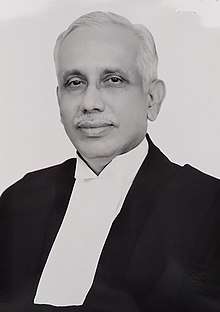S. Abdul Nazeer
Justice S Abdul Nazeer (born 5 January 1958 at Beluvai[1] near Moodbidri,[2]) is a Judge of Supreme Court of India. He is former Judge of Karnataka High Court.
Hon'ble Justice S. Abdul Nazeer | |
|---|---|
 | |
| Judge of Supreme Court of India | |
| Assumed office 17 February 2017 | |
| Nominated by | Jagdish Singh Khehar |
| Appointed by | Pranab Mukherjee |
| Judge of Karnataka High Court | |
| In office 12 May 2003 – 16 February 2017 | |
| Nominated by | V. N. Khare |
| Appointed by | A. P. J. Abdul Kalam |
| Personal details | |
| Born | 5 January 1958 Beluvai near Moodbidri, Karnataka |
Biography
Abdul Nazeer was born into a Muslim family belonging to the Kanara region of Karnataka, that is coastal Karnataka. He is the son of Fakir Saheb and he has five siblings.[1] He grew up in Beluvai/Moodbidri and completed his B.Com degree at Mahaveera College, Moodbidri. He later obtained a law degree from SDM Law College, Kodialbail, Mangaluru.[2][1] (formerly known as "Sri Dharmasthala Manjunatheshwara Law College").
After taking his law degree, Nazeer enrolled as an Advocate on 1983 and practiced at the Karnataka High Court in Bengaluru. In May 2003, he was appointed as an Additional Judge of the Karnataka High Court.[3] He was later appointed a Permanent Judge of the same High Court. In February 2017, while serving as a judge of the Karnataka High Court, Nazeer was elevated to the Supreme Court of India. He became only the third judge ever to be elevated in this way, without first becoming the chief justice of some high court.[4]
In the Supreme Court, Abdul Nazeer was the lone Muslim judge in a multi-faith bench which heard the controversial Triple Talaq case in 2017.[5][6] Though Justice Nazeer and one other judge upheld the validity of the practise of Triple Talaq (Talaq-e-Biddat) based on that fact that it is permissible under Muslim Sharia Law, it was barred by the bench by 3:2 majority and asked the Central government to bring legislation in six months to govern marriage and divorce in the Muslim community.[7][8] The court said till the government formulates a law regarding triple talaq, there would be an injunction on husbands pronouncing triple talaq on their wives.[9][10]
References
- "Mangalorean Justice Abdul Nazeer among the 5 new judges of Supreme Court". Mangaloretoday.com. Retrieved 16 March 2017.
- "Moodbidri based Justice S Abdul Nazeer becomes Supreme Court judge | Udayavani - ಉದಯವಾಣಿ". Udayavani. Retrieved 16 March 2017.
- "Hon'ble Mr. Justice S.Abdul Nazeer". Karnatakajudiciary.kar.nic.in. Retrieved 16 March 2017.
- "HC judge elevated to Supreme court". The New Indian Express. 17 February 2017. Retrieved 16 March 2017.
- "Triple talaq case: Muslim judge on multi-faith bench kept mum all through".
- "5 Judges Of 5 Faiths Give Verdict On Triple Talaq".
- "Supreme Court declares triple talaq unconstitutional, strikes it down by 3:2 majority".
- "Five Supreme Court judges who passed the verdict on triple talaq".
- "Injunction on husbands pronouncing triple talaq until law is made: SC advocate".
- "This Is What Supreme Court Said In Triple Talaq Judgment [Read Judgment]".